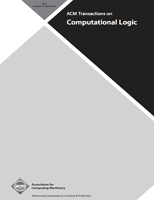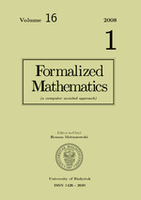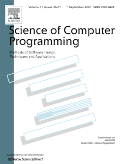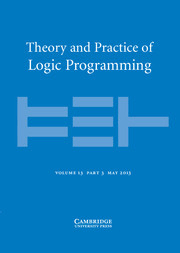
JOURNAL OF AUTOMATED REASONING
Scope & Guideline
Fostering Excellence in Automated Reasoning Methodologies
Introduction
Aims and Scopes
- Automated Theorem Proving:
Research on methodologies and tools for automated theorem proving, including both classical and higher-order logics, with a focus on efficiency and scalability. - Formal Verification:
Studies that explore formal methods for verifying the correctness of software and hardware systems, emphasizing the use of proof assistants like Coq and Isabelle/HOL. - Logic Programming and Reasoning:
Investigations into logic programming paradigms and reasoning systems, exploring their applications in various domains, including artificial intelligence and computational linguistics. - Proof Theory and Techniques:
Contributions that delve into proof theory, including the development of new proof systems, proof search algorithms, and techniques for theorem proving. - Applications of Automated Reasoning:
Research that applies automated reasoning methods to real-world problems, such as program verification, security protocols, and mathematical theorem proving. - Interdisciplinary Approaches:
Encouraging interdisciplinary research that combines automated reasoning with other fields such as machine learning, computational geometry, and formal languages.
Trending and Emerging
- Integration of Machine Learning with Automated Reasoning:
There is a noticeable increase in research that integrates machine learning techniques with automated reasoning, reflecting the growing interest in enhancing proof assistants and theorem provers through AI methodologies. - Scalable Proof Techniques:
Recent publications emphasize scalable proof techniques, particularly in the context of large and complex systems, highlighting a trend towards improving the efficiency and applicability of automated reasoning tools. - Formal Methods in Security and Cryptography:
An emerging theme involves the application of formal methods to security protocols and cryptographic systems, underscoring the importance of rigorous verification in ensuring security properties. - Advanced Applications in Program Verification:
There is a growing focus on sophisticated applications of automated reasoning in program verification, particularly for languages and paradigms that are gaining popularity in industry. - Interdisciplinary Approaches to Automated Reasoning:
Research increasingly encompasses interdisciplinary approaches, combining automated reasoning with areas such as computational geometry and hybrid systems, reflecting a broader applicability of the field.
Declining or Waning
- Traditional Logic Systems:
There seems to be a decrease in publications specifically dedicated to traditional or classical logic systems, as the field increasingly shifts towards more complex logics and applications. - Basic Theorem Proving Techniques:
The journal has seen fewer contributions focused on basic theorem proving techniques, indicating a trend towards more sophisticated and hybrid approaches to reasoning. - Historical Perspectives on Automated Reasoning:
Papers that provide historical perspectives or retrospectives on automated reasoning techniques and their evolution have become less frequent, suggesting a shift towards contemporary applications and methodologies. - Simple Geometric Theorem Proving:
The focus on basic geometric theorem proving has diminished, with more emphasis now placed on complex geometrical reasoning involving advanced mathematical constructs.
Similar Journals

ACM Transactions on Computational Logic
Pioneering Research in Computational LogicACM Transactions on Computational Logic, published by the Association for Computing Machinery, is a premier journal dedicated to the advancement of computational logic, spanning the disciplines of computer science and mathematics. With its ISSN 1529-3785 and E-ISSN 1557-945X, this journal has established itself as a vital resource within the academic community, particularly noted for its influential contributions reflected in its 2023 scopus rankings. The journal holds notable quartile rankings, achieving Q1 in the fields of Computer Science (miscellaneous) and Logic, alongside Q2 in Computational Mathematics and Theoretical Computer Science, indicating its prestigious position in the respective categories. Researchers, practitioners, and students can access a wealth of rigorous research articles that delve into both theoretical frameworks and practical applications of computational logic, fostering innovation and collaboration in the field. As it converges towards its 2024 objectives, ACM Transactions on Computational Logic continues to uphold a commitment to excellence and impact, striving to shape the future of computational theories and methodologies.

Formalized Mathematics
Fostering Collaboration in Formalized Mathematical ResearchFormalized Mathematics is a pioneering open-access journal published by SCIENDO, dedicated to the field of formalized systems and mathematical foundations. Since its inception in 2006, it has provided a platform for researchers to discuss and disseminate advancements in applied mathematics and computational mathematics, emphasizing formalization in mathematical reasoning. Although recent coverage in Scopus has been discontinued, the journal still serves as a valuable resource for academics looking to deepen their understanding of formalized approaches to mathematical problems. With its ISSN 1898-9934, the journal not only promotes unrestricted access to quality research but also facilitates collaboration among mathematicians and computer scientists. Given its rankings—20th percentile in Applied Mathematics and 18th percentile in Computational Mathematics—Formalized Mathematics is a vital conduit for innovative research, making it a significant asset for students, professionals, and scholars aiming to explore the intersection of mathematics and formal logic.

FUNDAMENTA INFORMATICAE
Connecting Minds in Theoretical Computer Science and Beyond.FUNDAMENTA INFORMATICAE is a distinguished academic journal published by IOS PRESS, focusing on the critical intersection of informatics, mathematics, and computer science. Since its inception in 1988, this journal has served as a vital resource for researchers and professionals alike, providing a platform for innovative studies in Algebra and Number Theory, Computational Theory and Mathematics, Information Systems, and Theoretical Computer Science. With an impressive HIndex, and ranking in the Q3 and Q4 categories across various disciplines as of 2023, it underscores its contribution and relevance in advancing the body of knowledge in these fields. The journal's commitment to excellence is reflected not only in its rigorous peer-review process but also in its notable rankings on Scopus, which positions it favorably among its peers. Though not yet available as an open access journal, FUNDAMENTA INFORMATICAE remains a crucial academic venue for authors wishing to disseminate their findings to a global audience, promoting collaboration and further research within the scientific community.

Theoretical Computer Science
Pioneering Insights in Computational FrameworksTheoretical Computer Science, published by Elsevier, serves as a pivotal platform in the field of computational theory, exploring the foundational aspects of computer science and mathematical logic since its inception in 1975. With both a print ISSN of 0304-3975 and an E-ISSN of 1879-2294, this journal is esteemed for its rigorous peer-review process and commitment to advancing knowledge in theoretical frameworks and algorithms. Positioned in the Q2 quartile for both Computer Science (miscellaneous) and Theoretical Computer Science categories, it ranks #124 out of 232 in general computer science and #73 out of 130 in theoretical computer science according to Scopus metrics, reflecting its significant influence and reach within the academic community. Researchers and professionals can access this journal through institutional subscriptions, providing a plethora of high-quality articles that contribute to ongoing debates and developments in the discipline. The journal's scope encompasses a wide array of topics, ensuring relevance across various subfields, thus making it an essential resource for anyone dedicated to furthering their understanding of theoretical computer science.

ACTA INFORMATICA
Unveiling Breakthroughs in Computer Networks.ACTA INFORMATICA is a prestigious academic journal published by Springer, dedicated to advancing the fields of computer networks and communications, information systems, and software engineering. With an ISSN of 0001-5903 and an E-ISSN of 1432-0525, the journal has continued to thrive since its inception in 1971 and is set to cover research up until 2024. Although it currently operates within a Q3 category in its respective fields, it is recognized for providing a platform for high-quality, peer-reviewed research, which is essential for fostering innovation and knowledge dissemination in computer science. While it does not offer an open access option, scholars benefit from its rigorous editorial standards and comprehensive coverage of significant trends and methodologies. The journal is conveniently based in New York, NY, USA, further enhancing its accessibility to a global audience. Researchers, professionals, and students alike will find ACTA INFORMATICA a valuable resource for staying abreast of the latest developments and breakthroughs in this vital area of study.

INTERNATIONAL JOURNAL OF APPROXIMATE REASONING
Advancing the Frontiers of Reasoning Under UncertaintyThe INTERNATIONAL JOURNAL OF APPROXIMATE REASONING, published by Elsevier Science Inc, stands as a pivotal resource in the domains of applied mathematics and artificial intelligence. Since its inception in 1987, the journal has evolved into a leader in its field, boasting an impressive impact factor and ranking within the top quartile for applied mathematics (Q1) and high standings in artificial intelligence and software categories according to the 2023 Scopus rankings. As researchers, professionals, and students delve into complex issues surrounding reasoning under uncertainty, this journal provides invaluable insights and cutting-edge research. In addition to its rich content, the journal's commitment to advancing knowledge in theoretical computer science further enhances its significance in fostering academic growth. While the journal does not currently offer open access, its rigorous peer-review process ensures that only high-quality, impactful studies are published, solidifying its role as an essential source for academics striving to remain at the forefront of their fields.

SCIENCE OF COMPUTER PROGRAMMING
Transforming Ideas into Computational ExcellenceScience of Computer Programming, published by Elsevier, is a leading journal dedicated to advancing knowledge in the fields of computer programming, computational theory, and software development. With a focus on interdisciplinary research that spans computational methodologies, information systems, and simulation modeling, this journal plays a vital role in disseminating innovative findings and fostering collaboration among experts in these dynamic areas. With a respectable impact factor and ranked in various Scopus Categories such as computational theory (Q3) and information systems (Q2), it provides a platform for high-quality scholarly articles that push the boundaries of programming science. Although currently not open access, the journal offers invaluable insights for researchers, professionals, and students alike, ensuring they are equipped with the latest advancements and methodologies to thrive in an ever-evolving technological landscape. The journal covers research from its convergence starting in 1981 and continues to welcome groundbreaking contributions as it looks forward to an exciting future through 2025 and beyond.

THEORY AND PRACTICE OF LOGIC PROGRAMMING
Pioneering Insights in Artificial Intelligence and Software Development.THEORY AND PRACTICE OF LOGIC PROGRAMMING, published by Cambridge University Press, is a premier academic journal that delves into the evolving field of logic programming, offering insights and advancements from 2001 to 2024. With an ISSN of 1471-0684 and an E-ISSN of 1475-3081, this journal serves as a vital resource for researchers, professionals, and students interested in areas such as artificial intelligence, computational theory, and software development. In 2023, the journal was recognized for its excellence, achieving Q1 status in Computational Theory and Mathematics and Q2 in several other categories, underscoring its significant impact within the academic community. Despite not being open access, its robust content, curated by esteemed scholars, guarantees high-quality research and innovative methodologies that are crucial for advancing the field. The journal's rigorous peer-review process and its standings in Scopus rankings further emphasize its relevance and authority, making it a quintessential platform for disseminating key findings and fostering scholarly dialogue.

Logical Methods in Computer Science
Advancing the frontiers of logic in computing.Logical Methods in Computer Science is a premier Open Access journal dedicated to fostering scholarly dialogue within the realms of Computer Science and Theoretical Computer Science. Established in 2004 and published by LOGICAL METHODS COMPUTER SCIENCE E V in Germany, this journal aims to bridge theoretical frameworks and practical applications, providing a platform for innovative research and discoveries. With an impressive HIndex reflecting its commitment to high-quality research, Logical Methods in Computer Science has achieved a Q2 ranking in both the miscellaneous and theoretical categories of computer science, indicating its growing influence in the academic community. Researchers, professionals, and students are encouraged to access and engage with the wealth of knowledge this journal offers, which is freely accessible to facilitate widespread dissemination of cutting-edge advancements in logical methods. With its convergence period extending from 2005 to 2024, Logical Methods in Computer Science continues to be a vital resource for those looking to explore the intersections of logic, computation, and mathematics.

JOURNAL OF LOGIC AND COMPUTATION
Pioneering Insights in Logic and Computational ScienceJOURNAL OF LOGIC AND COMPUTATION, published by Oxford University Press, is a leading peer-reviewed journal dedicated to advancing research in the intersections of logic, computation, and theoretical frameworks of computer science. With an ISSN of 0955-792X and an E-ISSN of 1465-363X, the journal has established itself within academic circles, boasting significant impact evidenced by its category quartiles, including a Q1 ranking in Arts and Humanities (miscellaneous) and a Q2 in Logic for 2023. This prestigious journal emphasizes interdisciplinary approaches to understanding computational systems, hence targeting a diverse audience of researchers, professionals, and students keen on exploring provocative questions in logic and computation. Although not open access, the content is highly valuable, reflecting contemporary challenges and advancements in the field. With over three decades of published work, spanning from 1990 to 2024, the journal continues to contribute richly to the discourse surrounding logical methodologies and computational innovations, making it an essential resource for those engaged in these dynamic areas of study.